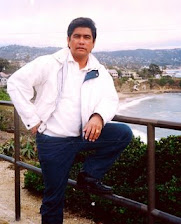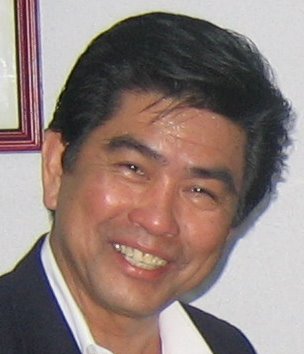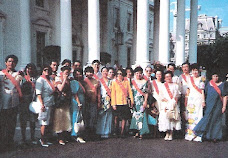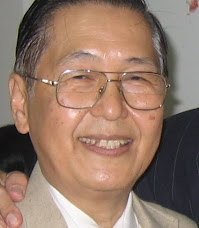
FELICIANO BELMONTE, JR.
Mayor of Quezon City (2001 – present)
Most Outstanding City Mayor of the Philippines in 2003
Mr. Serbisyong Bayan “SB”
Six years of prudent fiscal management, aggressive tax management strategies, as well as increasing efficiency and growing discipline in the management and use of our resources has made Quezon City one of the most bankable local government units in the country today.
QC: Best managed local government
Mayor Feliciano Belmonte’s leadership has brought wide recognition of Quezon City as one of the best managed local governments of the country. Effective capacity building and fiscal and financial management systems are the foundations that Quezon City is building its growing strength on.
Belmonte explains, “I am lucky to be mayor at a time when the global trend is that cities have become the center of economic competition. Cities are now the new nations, able to source for themselves investments, business opportunities and resources. In the Philippines, more progressive cities like Quezon City are igniting the engines of growth. Competition becomes easier now that we have put our “house” in order.”
Over the past six years, the Belmonte administration has developed a Quezon City that has become a model of effective governance, a case study of effective strategies by national and local governments here and abroad.
Dramatic turnaround from bankruptcy into most competitive city
When Belmonte was first elected mayor in 2001, Quezon City was the most financially distressed local government unit in Metro Manila and perhaps, nationwide. The city had a debt of P1.25 billion to the Land Bank and payables to various contractors amounting to P1.4 billion. The general fund was overdrawn by P10 million. In just two years, he was able to turn a bankrupt city into the richest city in the country, a feat very few mayors have achieved.
His goal in building up the City’s financial position is to create a viable resource base that can fund its economic transformation. In just five years, he has transformed a laggard into one of the most competitive cities of the country today. For the first time in many decades, the people of Quezon City are happy about the present and excited about the future.
Consistently since 2002, the Commission on Audit and the Department of Finance has regarded Quezon City as the local government unit (LGU) with the highest net income in the Philippines. For four straight years, the City produced a budget surplus averaging P282 million annually.
Investments in a better life
These resources are now being parlayed into the development and transformation of Quezon City. The people of Quezon City are now enjoying the fruits of more than P 8 billion worth of infrastructure investments. These are investments to make people’s lives better – through safer communities, through more productive environments because people and vehicles can move faster and more conveniently to destinations, and through more pleasurable and healthy surroundings.
Throughout his administration, Belmonte has been investing in LIFE:
* Livelihood and entrepreneurship, which mean investments in productivity that lead to enterprise creation and job generation
* Infrastructure development, which redound to investments in the physical transformation of the City, improving the overall environment for business and almost all aspects of community life
* Fiscal and financial management, which are continuing investments in strengthening governance and management capacity
* Education, which represent significant initiatives in knowledge creation and expansion.
To quote the Mayor, ”I did not aspire to be a mayor simply to look good while in Office. I have heard a man say that the first task of a leader is to keep hope alive. I want to go beyond that. I am working to make hope happen. I want the ensuing reality to endure for many years to come by investing in the future.”
Pioneering in many areas
The trademarks of Belmonte’s style of management have been:
* Operations efficiency
* Prudence and judiciousness in the use of resources
* Innovation and the setting of precedents
It is under the Mayor’s leadership that Quezon City achieved many firsts:
* 1st to computerize revenue collection and assessment function
* 1st to grant to barangays (community-level local government unit), full fiscal control over their share of real property tax collections
* 1st to institutionalize Citywide citizen participation in governance thru the City Development Council
* 1st Urban Center to implement the Solid Waste Management Act
* 1st to use Clean Development Mechanism (CDM) as biogas-reduction strategy and revenue generation mechanism from waste
* 1st LGU to manage an advanced computer training center
* 1st to enact a Gender and Development Code for the protection of women and children
Effective fiscal management
Belmonte is best known for his fiscal management acumen. Among his first moves as QC mayor was to revitalize tax collection. His focus on computerization has instituted efficiency and service innovations that has made taxpaying easy, accurate and less prone to graft. The City government developed a database system that now contains around 400,000 real property units with capability to record payments, and the capacity to service 20,000 taxpayer transactions a day.
Belmonte was bold enough to pursue needed resource-saving and revenue-generating strategies that other politicians may steer clear off as unpopular moves. Early on in his first term, he let lapse the contracts of about 3,000 casuals whose services were no longer needed by the City government. The City also raised business taxes considerably, to make QC rates closer to the tax rates in neighboring cities.
According to Belmonte, these were sacrifices that had to be made in order to realize the vision of a "Quality Community."
Now, his administration is further tapping the benefits of technology, principally, Geographic Information Systems, to create new revenue sources, to ensure a continuously increasing revenue base for the City.
Participative governance
Belmonte is an advocate of participative governance
Because of the management policies and strategies of SB:
* Barangay captains are being trained to become effective “little mayors” in their respective localities
* Like Mayor SB, they are trained to become good fiscal managers by the City’s giving them full fiscal control over the barangay share of the real property taxes, and teaching them to properly account and budget these;
* Since 2002, P1.81 B real property tax shares has been remitted to the barangays
* They regularly attend management and public administration seminars thru a tie-up with UP’s National College of Public Administration
Moreover, Quezon City is the only local government unit with a regularly functioning Local Development Council. It was organized and launched for the first time under his administration. The CDC meets regularly, with the full complement of 142 barangay captains, 50 representatives of NGOs and POs, 4 congressmen and the chair of the City Council’s Appropriations Committee
Innovations in environmental management
Quezon City has been accorded the accolade the 2nd Cleanest and Greenest City of the Philippines, according to the country’s Department of Environment and Natural Resources.
When Belmonte first assumed office in 2001, he was astounded by the staggering cost of garbage collection, which even reached as high as P80 million a month. He directed the study and implementation of a package clean-up system, to replace the corruption-prone and contractor-influenced “per-trip” system This resulted in a much cleaner city, with 500 tons less garbage a day, at a collection cost that was P 20 million a month less.
Once the scene of tragedy, the Payatas open dump has been converted into a controlled waste facility and has been recognized by the DENR as a model and pioneering disposal facility. It is now implementing a biogas reduction project using the Clean Development Mechanism under the Kyoto protocol.
Urban transformation strategies
Among the first dramatic transformations in Quezon City under the Belmonte administration happened in Novaliches which now has its park complete with a fully lighted fountain and promenade areas. Concreting and widening of streets, development of inter-linking roads, rationalization of traffic and discipline of pedestrians relieved years-old traffic problems in the area. Comments one resident, "Ang dami nang mayor ang dumaan pero walang nangyayari sa Novaliches. Ngayon pa lang, kay SB." (“We have had so many other mayors in the past, but no progress ever took place in Novaliches. It is only now, under Mayor Belmonte.”)
Other redevelopment efforts have taken place in the Tomas Morato Avenue areas, Metro Cubao and the other northern portions of the City. Belmonte’s administration has inspired such confidence in the private sector that investments in private developments have grown exponentially since SB took office. These are evident in the rise of new shopping malls, wide-scale real estate developments, office buildings especially those for business process outsourcing.
Investors are finding Quezon City to be a most cost-effective location, with the most expansive lands still available for broad-scale development.
Awards and citations received
* Stanvac Journalism Award from the National Press Club in 1957
* Outstanding Congressman of the 9th, 10th and 11th Congress
* Gintong Ama Awardee in 1993
* Paul Harris Fellow of the Rotary Club of Manila
* Model Filipino Awardee of the World Family Institute in 1994
* Outstanding Alumni (Lyceum of the Philippines)
* Benedictine Centennial Awardee (San Beda College)
* The Outstanding Filipino in Government Service of the Philippine Jaycees and Insular Life Philippines, 2002
* 2003 Most Outstanding City Mayor (Local Government Leadership Awards)
* Huwarang Pilipino Awardee for Local Governance (Huwarang Pilipino Foundation)
* CEO Excel Awards for Communications Excellence in the Government Sector, 2006
His governance of Quezon City further resulted in:
* 2003 Gawad Galing Pook Award for Effective Fiscal Management (Galing Pook Foundation)
* 2005 Gawad Galing Pook Award for Outstanding Government Program, Molave Youth Home (Galing Pook Foundation)
* "Most business-friendly city" awardee for 2003, 2004 and Hall of Famer in 2005 (Philippine Chamber of Commerce and Industry)
* DILG Model of Good Governance citation (Department of Interior and Local Government)
* 2003 Livable Community Award (Metrobank Foundation)
* 2003 Kabalikat sa Pabahay Award for the Local Government Unit with the Most Number of Community Mortgage Programs (Housing and Urban Development Coordinating Council)
***
The life of Feliciano “Sonny” Belmonte, Jr. shows that a deep commitment to work and a profound understanding and concern for others are important ingredients to success as a public servant.
Born in Manila on October 2, 1936 to Court of First Instance Judge Feliciano Belmonte, Sr. and his wife Luz, he imbibed the important values of public service from his parents. He attended elementary school in Baguio City and high school in San Beda College. He went to law school at the Lyceum of the Philippines while working as a young reporter at the Manila Chronicle. He continued to receive academic recognition even after he became a public official. The University of Baguio conferred upon him an Honorary Doctorate in Management. Subsequently, he was honored as an Outstanding Alumni of the Lyceum of the Philippines and was given the Benedictine Centennial Award of San Beda.
As a reporter covering the Manila Police Department and the Commission on Elections, Belmonte was exposed early to the socio-economic and political problems of the country. These influenced his decision to serve the public, an ambition he fulfilled in various capacities.
Belmonte started his career in government service in the 1960’s when he served as Presidential Staff Assistant of then President Diosdado Macapagal, Special Assistant to the Secretary of Finance, Special Assistant to the Commissioner of Customs and Executive Assistant of the Central Bank of the Philippines. He temporarily retired from government service during the martial law years. But when Corazon Aquino assumed the presidency in 1986, she tapped Belmonte to head various government-owned corporations that were on the brink of bankruptcy. He was appointed President and General Manager of the Government Service and Insurance System and The Manila Hotel, Chairman of the National Reinsurance Corporation of the Philippines, member of the Board of Directors of the San Miguel Corporation and the Philippine Long Distance and Telecommunications, Co. and most significantly, as the President and Chief Executive Officer of the Philippine Airlines. It was under Belmonte’s able leadership when PAL registered an unprecedented profit of 1.2 billion pesos, enabling it to pay all its obligations without borrowing a single peso or even firing a single employee despite the pressures from competition.
A public servant with unquestionable integrity and moral values, Belmonte has proven his outstanding character and responded to the needs of the people who have placed their trust in him by maintaining an unblemished reputation, standing by his principles and ideals. Thrice elected Congressman of the 4th District of Quezon City (virtually unopposed in his second and third run), he was able to serve both as House Minority Leader and House Speaker of the 11th Congress, a feat only Belmonte has done.
During his incumbency as legislator, he authored and co-authored major bills such as the General Appropriations Act (R.A. 7845, 8174, 8250 and 8522), the Act Providing for a Dual System of Education (R.A. 7686), An Act Increasing the Bed Capacity of the East Avenue Medical Center (R.A. 8374) and Joint Resolution No. 1 – Salary Upgrading of Government Officials and Employees otherwise known as the Salary Standardization Law. Belmonte shone even brighter in the public eye when he was chosen and entrusted to lead the prosecution panel in the impeachment case of President Joseph Estrada and the rest, as they say, is history.
Belmonte is adding to his outstanding record as a public servant in his present position as Quezon City’s Chief Executive. Upon his assumption as Mayor in July 2001, Mayor Belmonte vowed to make Quezon City a Quality Community through good fiscal management, systems improvement and effective delivery of services. Belmonte is well-known as “Mr. Serbisyong Bayan” among his constituents due to the numerous programs he initiated and completed.
His credentials as a private citizen are equally impressive. While Belmonte was a private law practitioner, he participated actively in various civic organizations. He joined the Manila Jaycees in 1967 and became its President in 1971 but it did not end there. He became President of the Philippine Jaycees in 1973, and in 1976, he brought honor to Filipinos by becoming the President of Jaycees International. In 1983, Belmonte joined the Rotary Club of Manila, and soon after, the Knights of Rizal where he became a Knight Commander. In the mid 1990’s, he was selected President of the University of the Philippines Open University Foundation. He was also a member of the Philippine Delegation to the 1957, 1997 and 2000 International Labor Organization’s International Conferences held in Geneva, Switzerland.
His family remains Belmonte’s greatest achievement. His wife, the late Betty Go Belmonte, founder of the Philippine Star, was a woman of courage and true Christian faith who stood by him in everything he did. They both shared a passion for political idealism, publishing and art. They have three sons and a daughter all of whom are successful in their own right – Isaac, editor-in-chief of the Philippine Star; Kevin, President of Philstar.com; Miguel, President and Chief Executive Officer of the Star Group of Companies; and Joy, an archeologist and civic leader.
Mayor FELICIANO BELMONTE, JR. has inspired his colleagues, constituents and even adversaries in making a difference in public service even in a graft-ridden society like ours by promoting productivity, efficiency and accountability. He has given a new meaning to the term Government Official by virtue of his outstanding accomplishments over the years. He was once quoted as saying, “I saw that bureaucracy is almost by definition the first hindrance to quick action, and that the government does not operate on the basis of ‘value for money’ as should be the case. It is not just a question of climate or culture, but also of morale and incentives in action.”















